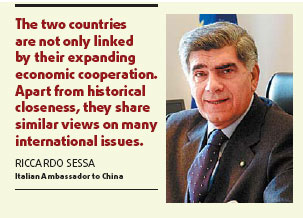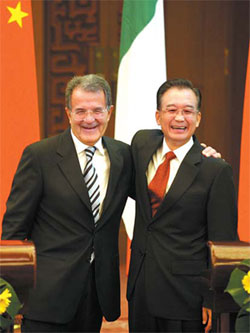More Italy in China; more China in Italy
Chinese Premier Wen Jiabao meets with Italian Prime Minister Romano Prodi during his visit to China on September 18, 2006. Wu Zhiyi |
This spirit of interaction was reflected on posters seen on many Chinese streets last year, which had Michelangelo's David saying "ni hao" and a terracotta warrior answering "Ciao" - the Chinese and Italian versions of "Hello" - indicating initial greetings between the two ancient civilizations before the real conversation followed.
"The momentum will not end with the passing of the year 2006; on the contrary it is just the beginning of a new impetus to bilateral relations" whose strategic partnership - enhanced by the establishment of a Joint Bilateral Committee in 2004 - was adjourned last September during the meeting of the Italian and Chinese prime ministers in Beijing, Sessa told China Daily recently in an exclusive interview.
Since 2000, Sino-Italian trade has seen an annual increase of 22 percent. In 2005, the bilateral trade volume reached $18.6 billion, and the figure hit $24 billion in 2006, up 32 percent year-on-year, a trend which seems to be confirmed also for this year looking at the Chinese economic data for the first quarter of 2007.
 "The two governments aim to double their bilateral trade volume within five years, while progressively rebalancing it" said Sessa.
"The two governments aim to double their bilateral trade volume within five years, while progressively rebalancing it" said Sessa.
"To meet this goal, we need to speed up our bilateral cooperation in all possible directions. Partnerships in the small and medium-sized enterprises (SMEs) sector, in healthcare and in environment are top of the agenda. Realizing the disadvantages faced by traditional Chinese medicine (TCM) on the global market, Italy and China have recently co-founded a TCM center that not only engages itself in research work but also conducts clinical experiments and sales promotion. On environment, Italy has implemented a fruitful and comprehensive cooperation program, which among other significant initiatives has led to the construction with Tsinghua University of the Sino-Italian Environment and Energy Efficient Building (SIEEB), powered by a sophisticated and modern system utilizing solar energy.
"But the two countries are not only linked by their expanding economic cooperation. Apart from historical closeness, they share similar views on many international issues, especially on Africa and the Middle East," Ambassador Sessa said, passing on to the political domain.
"Italy is a member of the United Nations Security Council till 2008 and will serve as rotating President of the G8 group in 2009, which will enable both countries to further develop their friendship and common understanding," said Sessa.
Welcome to Italy
Given Italy's unique geographical location in the heart of the Mediterranean Sea, linking it to Europe, North Africa and the Middle East, the Ambassador invited more Chinese businesspeople to invest in Italy as well as more tourists from China to visit it.
"Many Chinese may think it is difficult to get a visa to Italy, but that is no more the case, as the growth of visas issued to Chinese tourists in 2006 and in the first quarter of this year - the highest within European Union - clearly proves," Ambassador Sessa said, promising Italian consular network in China will soon provide even more efficient services to Chinese applicants.
"In the hearts of many Chinese, Italy is a dreamland. It conjures up a unique culture and tradition with an undisputable and internationally recognized taste for excellence. Italian people seem to possess natural skills in infusing beauty and value into anything, whether it is architecture, fashion, modern technological devices or even food," he added. "In other words Italy is equal to a very peculiar way of living which cannot be compared to any other", the Ambassador said.
"In a globalized world, almost any product can be made by many countries, but if you are looking for the finest, your search cannot be directed but towards something 'made in or by Italy.'
"For us, paying attention to the tiniest details is in fact almost a habit. And thanks to our devotion to details and creativity, Italy is home to many top luxury brands, such as Ferrari and Armani.
As China is getting rich and is becoming one of the largest consumer of those types of goods in the world, Italian brands have found here an increasing number of fans, especially among the young people," the Ambassador said, adding that "with the local living conditions continuing to rise as expected, I am quite confident that Italy could count on a bigger share of the pie."
A rich culture
The Year of Italy in China was another signpost on the fast lane of development of relations between the two countries.
More than 8 million Chinese participated, directly or indirectly, in activities held to mark the Italian year.
"Through the Year of Italy in China, my country not only presented its past, but also its present and future," Sessa emphasized.
"No matter how close we are getting, it won't invite jealousy from other countries because the similarities between our two countries - long history, rich culture and centers of civilization - can not be compared to any other," the Ambassador proudly said.
But Sessa reminded that cultural richness should instill not only a sense of pride in its people, but also a sense of responsibility.
Italy is good at protecting the old as well as at creating the new.
With its proven excellence in protecting and restoring ancient cultural heritage, Italy has been cooperating with China on many heritage protection programs in terms of financial aid, delegation of experts and training.
"Protecting and making the best use of cultural heritage are the responsibility and obligation of our governments and people," the Ambassador said.
"As we develop and modernize, we should make sure that modernization is not achieved at the cost of our cultures," he added.
As Italian names become familiar to more and more Chinese, China is no stranger to Italians either.
"Chinese culture and food are very popular in Italy, and like new Italian restaurants popping up everywhere in China, there are new Chinese ones being opened almost every day back in my country," Sessa said.
More than 700 years ago, the famous Italian traveler Marco Polo wrote a book to tell the tale of his travels across China. That book was the introduction to China for many Italians.
"So you can see, to many Italians, China was not a stranger even in history," Sessa said.
"Many people in Italy know what China was, is and will be."
Diplomats often like to pen memories about the lands they work in. Although Sessa is not sure whether he will follow suit, he promised if he really felt like writing a book, it would certainly be about China.
(China Daily 06/05/2007 page25)















